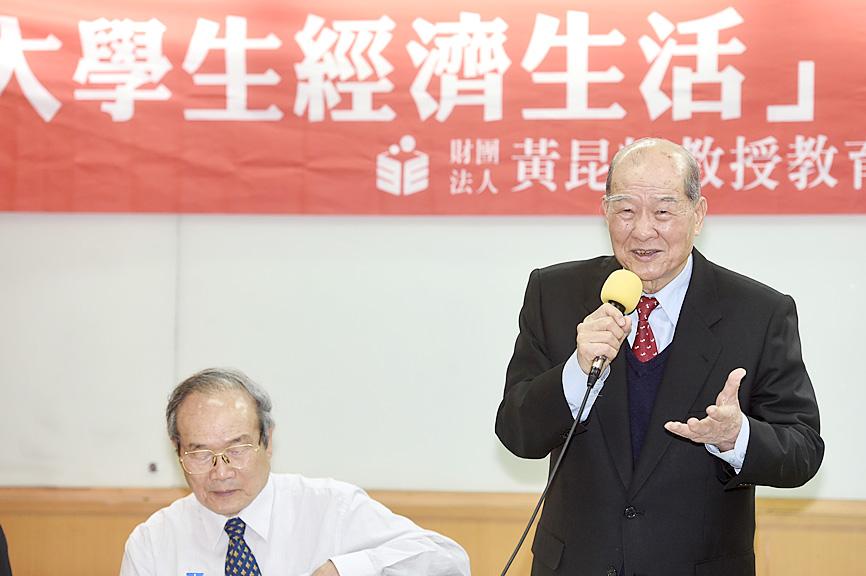Most university students believe that low wages and too few entry-level jobs are problems they would face when entering the job market, a survey by the Professor Huang Kun-huei Education Foundation showed yesterday.
The survey, conducted with a focus on “outlook on job prospects and economic conditions” among the university students, showed that 78.8 percent of respondents expected problems finding a suitable job for an adequate salary.
It also showed that 70.5 percent of them agreed that “obtaining a tertiary education degree is the main way for those from low-income families to lift themselves out of poverty,” even though 64.5 percent agreed that “studying to get a degree is a costly investment with low returns.”

Photo: George Tsorng, Taipei Times
Foundation chairman Huang Kun-huei (黃昆輝) said that a previous survey found that 40.4 percent of students questioned the value of tertiary education, so the latest poll focused on the reason for students’ doubts.
The latest survey showed that 65.6 percent felt uncertain about the future and did not know the direction their life is taking, while 39.2 percent said their schools do not offer quality education that would help them acquire skills that would be useful in the job market.
It also showed that 37.6 percent viewed their field of study as not offering good job prospects, 37.5 percent said their field of study does not match their interests, and 12.5 percent said they did not have the skills needed to get a job.
A large number of survey participants said they do not have a good prospect for getting a job after graduation, at 39.5 percent, of whom 54.5 percent said they believe they can only get a low-wage job, 50.1 percent said they are worried about becoming unemployed upon graduation and 37.1 percent said Taiwan lacks opportunities for young people, it showed.
“All this indicates that we have serious problems with our tertiary education system,” Huang said, urging the Ministry of Education to work toward solutions.
National Taiwan Normal University College of Education dean Chen Hsueh-chih (陳學志) said that Taiwan has for years been underperforming in terms of wage growth and people were increasingly facing higher costs of living.
About one-third of the nation’s industries could not keep up with price increases indicated in the consumer price index, Chen added.
“I hope the government can work to solve the low-wage problems and constrain housing prices to reasonable levels,” Chen said, adding that this would give graduates hope.
The survey was conducted from Jan. 1 to Feb. 6 and received 5,398 valid questionnaires from students at public and private universities, as well as vocational colleges.

Alain Robert, known as the "French Spider-Man," praised Alex Honnold as exceptionally well-prepared after the US climber completed a free solo ascent of Taipei 101 yesterday. Robert said Honnold's ascent of the 508m-tall skyscraper in just more than one-and-a-half hours without using safety ropes or equipment was a remarkable achievement. "This is my life," he said in an interview conducted in French, adding that he liked the feeling of being "on the edge of danger." The 63-year-old Frenchman climbed Taipei 101 using ropes in December 2004, taking about four hours to reach the top. On a one-to-10 scale of difficulty, Robert said Taipei 101

Nipah virus infection is to be officially listed as a category 5 notifiable infectious disease in Taiwan in March, while clinical treatment guidelines are being formulated, the Centers for Disease Control (CDC) said yesterday. With Nipah infections being reported in other countries and considering its relatively high fatality rate, the centers on Jan. 16 announced that it would be listed as a notifiable infectious disease to bolster the nation’s systematic early warning system and increase public awareness, the CDC said. Bangladesh reported four fatal cases last year in separate districts, with three linked to raw date palm sap consumption, CDC Epidemic Intelligence

Two Taiwanese prosecutors were questioned by Chinese security personnel at their hotel during a trip to China’s Henan Province this month, the Mainland Affairs Council (MAC) said yesterday. The officers had personal information on the prosecutors, including “when they were assigned to their posts, their work locations and job titles,” MAC Deputy Minister and spokesman Liang Wen-chieh (梁文傑) said. On top of asking about their agencies and positions, the officers also questioned the prosecutors about the Cross-Strait Joint Crime-Fighting and Judicial Mutual Assistance Agreement, a pact that serves as the framework for Taiwan-China cooperation on combating crime and providing judicial assistance, Liang

US climber Alex Honnold left Taiwan this morning a day after completing a free-solo ascent of Taipei 101, a feat that drew cheers from onlookers and gained widespread international attention. Honnold yesterday scaled the 101-story skyscraper without a rope or safety harness. The climb — the highest urban free-solo ascent ever attempted — took just more than 90 minutes and was streamed live on Netflix. It was covered by major international news outlets including CNN, the New York Times, the Guardian and the Wall Street Journal. As Honnold prepared to leave Taiwan today, he attracted a crowd when he and his wife, Sanni,